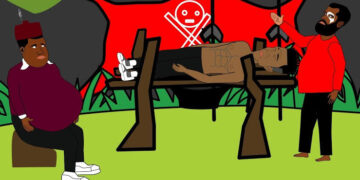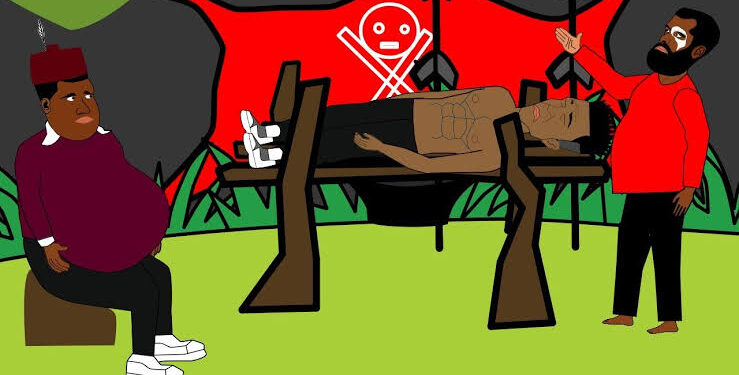By Emmanuel Nduka
The rise in cases of rituals for money among Nigerian youths has triggered the argument that the trade is learnt from Nollywood movies. But without doubt, one of the common themes that thrived in Nollywood movies was money rituals. And while such stories could be entertaining, especially with the mystical manipulations embedded in them, could the deeper theme of rituals for quick riches be misinterpreted by the nowadays desperate Nigerian youths?
However, before this revelation, some Nigerians had in the past shared the view that money rituals in Nollywood movies have influenced the youths negatively and pushed them into rituals. But Nollywood should not be blamed 100 percent for the misadventure. The government, immediate family, religious institutions, peer groups and the society at large are all critical contributors, according to social science orientation.
Earlier in February, the Nigerian Government ordered movie makers to take out rituals for money contents in their movies. According to the Government, the move to ban such scenes follows a long-standing debate of whether Nollywood contributes to Nigeria’s social vices or that the industry is merely a reflection of the larger society. But this is not the solution, it is merely a deflection of blame.
Interestingly, in these movies, the storylines are mostly balanced. They are scripted to foretell the negative consequences that blood money brings. For instance, a certain character who cannot afford to wait for God’s time to prosper, ventures into rituals for money. The climax of the story is usually such that the character dies after a short while of becoming rich, runs mad, or is made to pay certain near-impossible penalties to sustain the filthy wealth.
While this should ordinarily deter intending ritualists, the get-rich-quick syndrome among the modern-day youths may also overwhelm their conscience. They are desperate and eager to tow the satanic and easy path to riches. These group of money seekers are mostly teenagers, or in their early 20s. All they require the quick money for is to buy luxurious cars, buy expensive gadgets, clothing et al. Their immediate need for money is to show off.
A close observation of some of these rich kids however, indicates that they enter into rituals out of societal pressure, and not necessarily because they watch Nollywood. In fact the theme of very recent Nollywood movies are centered around love, promiscuity, failed marriages, or just pure comedy. Ritual money movies were in vogue in the late 1990s up till the early 2000s. Kanayo. O. Kanayo, Pet Edochie, Clem Ohameze, just to mention a few, were the preachers of the theme. Yul Edochie, son of one of the veterans earlier mentioned, is one of the most recent interpreter of money rituals in Nollywood. But he is fast moving away from playing such roles. Even in all this, Nollywood must be commended for always ensuring that the story does not end without the part where there is a costly price to pay for money rituals.
The Nigerian Government has since joined the bandwagon of of the jesters suggesting that Nollywood inspires rituals for money among Nigerian youths. Speaking in Abuja in February, Nigeria’s Minister of Information and Culture, Lai Mohammed, alleged that some of the arrested ritual killers have confessed to him that they learnt their act on social media and Nollywood. Thus, the Government has said it intends to sanitize the system.
“Many have also blamed Nollywood for featuring money rituals in some of its movies, saying this has negatively influenced the vulnerable youth. To mitigate this, I have directed the National Film and Video Censors Board, the body set up to regulate the film and video industry in Nigeria, to take this issue into consideration while performing its role of censoring and classifying films and videos,” the Minister said
Also bothered by the trend, Nigeria’s House of Representatives had on its own part, asked the Federal Government to declare a state of emergency on the rising incidence of ritual killings in the country. A motion moved by its Deputy Minority Leader, Toby Okechukwu, called on the Inspector General of Police, Usman Alkali Baba, to “take urgent steps to increase surveillance and intelligence gathering with a view to apprehend and prosecute (sic) all perpetrators of ritual killings in Nigeria”. House members also ordered the National Orientation Agency, NOA to “initiate a campaign towards changing the situation in the country”.
Responding to the Government’s claims, practitioners in Nollywood have wondered when “the industry become the problem of bad governance, bad roads”. The practitioners have shifted the blame back to the Federal Government for the rising cases of ritual killings in the country. According to them, ritual killings are not the making or creation of filmmakers.
Firing back at the Government, Comrade Alex Eyengho, Board of Trustees Chairman, Association of Nollywood Core Producer, ANCOP, pleaded with journalists to discard the Government’s directive. He posited that instead of issuing this sort of laughable directive, the Federal Government should put machinery in place to clamp down on ritualists, fraudsters, kidnappers, armed robbers, human traffickers, corrupt officers and all other criminal activities going on in the country on daily basis.
“I think it is within the limited knowledge of the Federal Government to issue such directives to “filmmakers to stop making films on ritual killings.” It is preposterous for the government to think of such a thing in the first place. Assuming but without conceding that the government was right in this military-like directive, it is a clear admittance of the failure of the National Film and Video Censors Board (NFVCB) currently under the leadership of Alhaji Adedayo Thomas in performing its statutory functions as a Federal Government agency in terms of appropriate classifications and censorships of motion picture contents in Nigeria.
“To the best of my knowledge, filmmakers don’t make films to promote rituals. Rather, filmmakers make films to condemn the incessant ritual killings in Nigeria. Ritual killings are not the making or creation of filmmakers. We only bring the sad narrative to the front burner in a manner that would make it serve as a deterrent to those who are bent on engaging in the heinous crime. The Federal Government and National Assembly should stop advertising their crass ignorance in the public space.
“Nollywood is not the same thing as social media. These people up there should not get things twisted with their half-knowledge or total absence of knowledge of what filmmakers really do. Rather than issuing this sort of laughable directive, the Federal Government should put machinery in place to clamp down on ritualists, 419ers, scammers (yahoo yahoo and yahoo plus), kidnapping, armed robbery, human trafficking, corruption at all levels and all other criminal activities going on in our dear country daily.
“However, I can only urge my most Distinguished Creative Colleagues in Nollywood to apply wisdom, professionalism and national interest in the kind of contents they push out there, particularly in terms of the core messages and ultimate resolutions,” Eyengho stated.
Also speaking for Nollywood, Lancelot Imasuen, a prominent film director, told the Federal Government that it got its priorities wrong and wondered why it would make such an unwelcomed statement that a particular sector is responsible for the ritualistic practices in the country.
“What are the indices that gave the government that conclusion. Why, how did we get where we are today. When did Nollywood become the problem of bad governance, bad roads and the reason for the economic downturn? The Nigerian film industry has always been portraying what is evidently wrong with the country and proffering solutions. I’m sure there are movies that encourage people to go and take into ritualistic practices to make money. It’s so sad to hear such a thing from the federal government,” he said.
But aside these blame games, there are some other factors that may be responsible for this societal ill. There is the dwindling value system in the country, which is a motivating factor for juvenile delinquency. This is traceable to the lack of job opportunities for the teeming youths. Also, the flagrant display of wealth and lavish lifestyle especially on social media by celebrities, further pushes the young ones into rituals. Parents too are guilty for failing in their responsibilities to bring up their children uprightly. These days, some parents even receive money from children who have no source of income without questioning them.
For Minister of Works and Housing and former Governor of Lagos State, Babatunde Fashola, money ritual is a myth, thus, movie makers must stop telling such stories. But that is not the whole truth, it may be part of it. Fashola, who was the guest speaker at the fourth annual public lecture/symposium recently organised by the United Action for Change, themed, ‘Security of citizens as a social contract’, said that belief system, reinforced through Nollywood movies, could be fuelling kidnapping and other social vices, given the number of persons the police have arrested with human skull and other body parts, with the motive of money ritual.
But the former governor, who titled his lecture, ‘Insecurity: Taking actions against organised crime’, however, said it was high time moviemakers and policymakers changed the narrative, to save innocent lives from being wasted.
“Some people believe that if you get a man’s head or a woman’s body parts, they could be turned into money. It’s not true! And when you ask people who believe in it if they have seen it happen before, they tell you someone said they had seen it.
“However, it has become a reinforced belief through entertainment, social media and Nollywood. How can human head bring money? Money is paper invented by man, not God. They put the paper in a machine to print what we call money and that is the only place money comes from.
“But the challenge is the belief system. Just think about how many people have been missing – through kidnapping – because some people believe that it exists. The police could tell us the number of people they have apprehended with human parts, such as skulls. This belief system must go.
“Therefore, all of us, including those who make the films, must reverse the story and start selling a new story that money is printed in a machine and not through any other way like money rituals,” Fashola said.




































